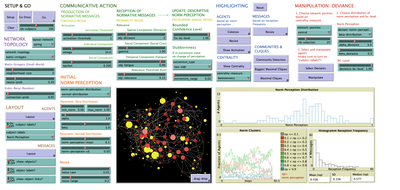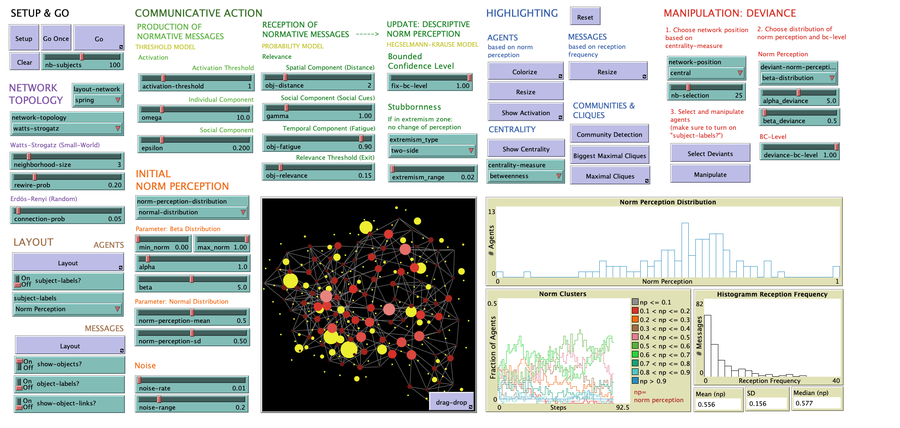COMM-PDND: Communication-Based Model of Perceived Descriptive Norm Dynamics in Digital Networks (1.0.0)
The Communication-Based Model of Perceived Descriptive Norm Dynamics in Digital Networks (COMM-PDND) is an agent-based model specifically created to examine the dynamics of perceived descriptive norms in the context of digital network structures. The model, developed as part of a master’s thesis titled “The Dynamics of Perceived Descriptive Norms in Digital Network Publics: An Agent-Based Simulation,” emphasizes the critical role of communication processes in norm formation. It focuses on the role of communicative interactions in shaping perceived descriptive norms.
The COMM-PDND is tuned to explore the effects of normative deviance in digital social networks. It provides functionalities for manipulating agents according to their network position, and has a versatile set of customizable parameters, making it adaptable to a wide range of research contexts.

Release Notes
Click Download to get access to the ABM - along with the full documentation and simulation outputs (Tip: The NetLogo model is located in the “code” directory).
To run the ABM, NetLogo 6.3 can be downloaded from the following link: http://ccl.northwestern.edu/netlogo
Associated Publications
Deffuant, G., Amblard, F., Weisbuch, G., & Faure, T. (2002). How can extremism prevail? A study based on the relative agreement interaction model. Journal of artificial societies and social simulation, 5(4). https://www.jasss.org/5/4/1.html
Flache, A., Mäs, M., Feliciani, T., Chattoe-Brown, E., Deffuant, G., Huet, S., & Lorenz, J. (2017). Models of Social Influence: Towards the Next Frontiers. Journal of Artificial Societies and Social Simulation, 20(4), 2. https://doi.org/10.18564/jasss.3521
Friemel, T. N., & Neuberger, C. (2021). Öffentlichkeit als dynamisches Netzwerk. In M. Eisenegger, M. Prinzing, P. Ettinger, & R. Blum (Hrsg.), Digitaler Strukturwandel der Öffentlichkeit (S. 81–96). Springer Fachmedien Wiesbaden. https://doi.org/10.1007/978-3-658-32133-8_5
Hegselmann, R. & Krause, U. (2002). Opinion Dynamics and Bounded Confidence, Models, Analysis and Simulation. Journal of Artificial Societies and Social Simulation, 5, 2. https://www.jasss.org/5/3/2.html
Lorenz, J. (2012). Continuous Opinion Dynamics under Bounded Confidence. NetLogo. http://ccl.northwestern.edu/netlogo/models/community/bc
Piedrahita, P., Borge-Holthoefer, J., Moreno, Y., & González-Bailón, S. (2018). The contagion effects of repeated activation in social networks. Social Networks, 54, 326–335. https://doi.org/10.1016/j.socnet.2017.11.001
COMM-PDND: Communication-Based Model of Perceived Descriptive Norm Dynamics in Digital Networks 1.0.0
Submitted by
Lars Reinelt
Published Sep 08, 2023
Last modified Sep 08, 2023
The Communication-Based Model of Perceived Descriptive Norm Dynamics in Digital Networks (COMM-PDND) is an agent-based model specifically created to examine the dynamics of perceived descriptive norms in the context of digital network structures. The model, developed as part of a master’s thesis titled “The Dynamics of Perceived Descriptive Norms in Digital Network Publics: An Agent-Based Simulation,” emphasizes the critical role of communication processes in norm formation. It focuses on the role of communicative interactions in shaping perceived descriptive norms.
The COMM-PDND is tuned to explore the effects of normative deviance in digital social networks. It provides functionalities for manipulating agents according to their network position, and has a versatile set of customizable parameters, making it adaptable to a wide range of research contexts.
Release Notes
Click Download to get access to the ABM - along with the full documentation and simulation outputs (Tip: The NetLogo model is located in the “code” directory).
To run the ABM, NetLogo 6.3 can be downloaded from the following link: http://ccl.northwestern.edu/netlogo

